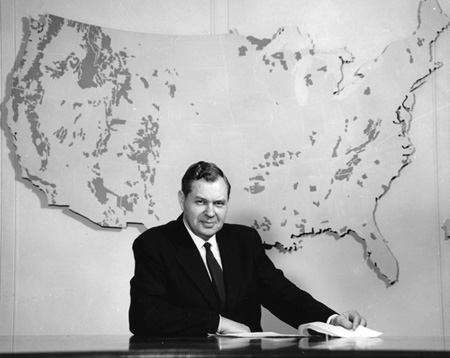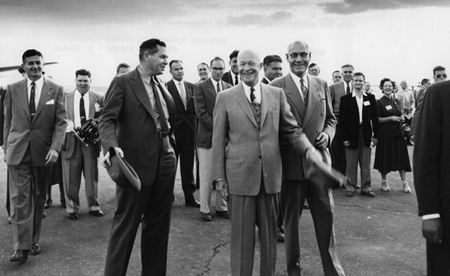By Tacy Lambiase
I first discovered American Forests last fall, purely by chance. As an undergraduate student, I am always looking for amazing internship opportunities. Last fall, I was hunting for a particular kind of experience: I wanted a communications internship with an environmental nonprofit organization where I could connect my passion for the environment with my communications skills. But when I began my internship with American Forests this past January, I had no idea that I already had a family connection to the organization.
Earlier this spring, I had lunch with Richard C. McArdle, my first cousin twice removed (my grandmother’s cousin) who lives in Washington, D.C. A retired employee of the U.S. Department of Agriculture, Richard and his family members have a history of being involved with forestry and land-use policy. When I told him about my internship, Richard surprised me by saying that his father, Richard E. McArdle (hereafter referenced as McArdle), had been the eighth chief of the U.S. Forest Service from 1952-1962. Even more surprising, and coincidental, was the fact that McArdle had also been a long-time board member of American Forests, when the organization was still known as the American Forestry Association.

McArdle started working for the Forest Service in 1924 as a junior forester after receiving his bachelor’s degree in forestry from the University of Michigan. During the 1920s, McArdle also worked on his master’s and doctoral degrees, earning his doctorate from Michigan in 1930. After serving as the dean of the forestry program at the University of Idaho from 1934 to 1935, McArdle would go on to become the chief of the Forest Service, a position he would hold for 10 years.
As chief, McArdle was responsible for the management of national forests and national grasslands. He also played an instrumental role in the passage of the Multiple-Use Sustained-Yield Act of 1960. This act ensured that renewable resources in national forests, such as timber and water, would be used responsibly and sustainably.
McArdle continued his work to protect and care for forests long after his term as chief was over. He served as a director for the American Forestry Association from 1958 to 1981 and was made a board member in 1963. An article announcing his appointment to the board of directors stated that “Dr. McArdle has probably won more awards for outstanding service than any other conservationist in America.” These included the President’s Gold Medal for Distinguished Federal Civilian Service, the Rockefeller Public Service Award and the American Forestry Association Distinguished Service Award.
During his 39-year career with the Forest Service, McArdle was well-liked and respected. He was known by his friends and coworkers as “Chief” or “Mac” and had a knack for remembering people’s names, making those he knew feel appreciated and valued. In October 1983, McArdle passed away after collapsing at an American Forestry Association reception he was attending with friends and colleagues. In the November 1983 edition of American Forests, several people wrote tributes to McArdle including Edward P. Cliff, McArdle’s successor as chief of the Forest Service:
“Dick McArdle served with distinction as chief of the Forest Service during a period of great change and emerging new problems. The environmental movement exploded on the scene with astounding vigor. Wilderness preservation and environmental protection became national issues. … During this dynamic period, all Forest Service programs were strengthened in terms of available manpower, funding and competence. … Although McArdle gained a worldwide reputation, he will be best remembered by those of us who knew him well as a warm, compassionate, friendly human being and staunch friend. … With his passing, this country has lost a distinguished conservation leader; the world has lost a great human being.”

Learning about Richard E. McArdle’s dedication to the Forest Service and to this organization was a delightful experience — and a humbling reminder about how much just one person can do for forests and our nation’s conservation efforts. My time with American Forests has been meaningful and valuable, and I would like to thank all of the dedicated people at this organization who have made my experience great. I hope to continue on a career path where I can help protect and restore our environment, just like some of my family members and you all have done.